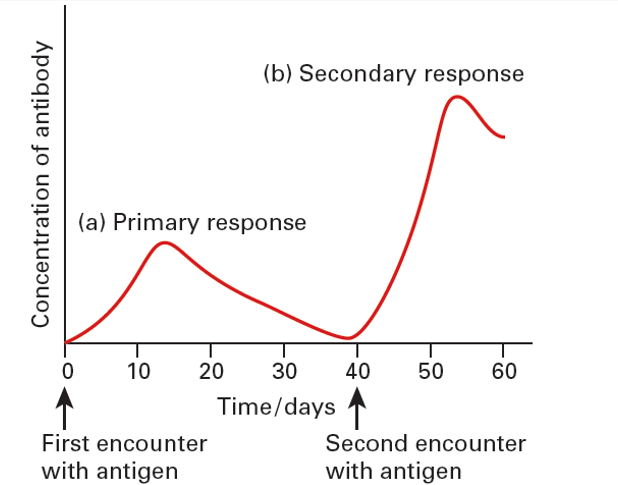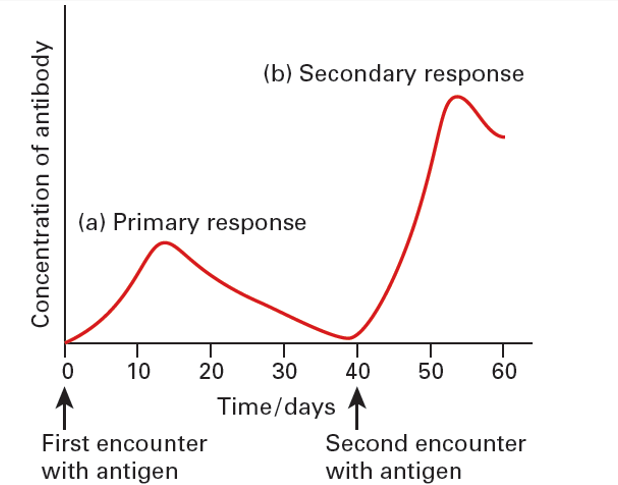immune responses
1/16
There's no tags or description
Looks like no tags are added yet.
Name | Mastery | Learn | Test | Matching | Spaced |
|---|
No study sessions yet.
17 Terms
what white blood cell is involved in specific immune response?
lymphocytes
types of lymphocytes (2)
where are they produced?
where are they matured?
-T lymphocytes [T cells] →mature in thymus gland
-B lymphocytes [B cells] →mature in bone marrow
-both produced in bone marrow
structure of T lymphocyte
its surface is covered with receptors
note: Different T cells have different receptors on their surface so bind to a different antigen
-how are T lymphocytes activated?
what happens after T lymphocytes are activated?
-processes in the specific immune response involving T lymphocytes
-receptor on T lymphocyte bind to a complementary antigen on antigen-presenting cells [clonal selection]
-this activates the T lymphocyte and causes it to divide by mitosis to produce clones [clonal expansion]
•Clonal selection: when the receptor on a T cell binds to a complementary antigen, activating the T cell.
•Clonal expansion: divides by mitosis to produce clones
different types of T lymphocytes and their roles (3→main 2 explain)
T helper cells
-release interleukins (type of cytokine) to activate B lymphocytes
T killer cells
-destroy infected cells
T memory cells
structure of B lymphocytes
its surface is covered with antibodies
how are B lymphocytes activated? (2)
what happens after B lymphocytes are activated?
-processes in the specific immune response involving B lymphocytes
-antibody on a B lymphocyte bind to a complementary antigen. T helper cells release interleukins to activate the B lymphocyte. [clonal selection]
-The activated B lymphocyte divide by mitosis and differentiate into plasma cells and memory cells. [clonal expansion]
•Clonal selection: when the antibody on a B cell binds to a complementary antigen and the B cell is activated by a T helper cell
•Clonal expansion:divides by mitosis to produce clones
role of plasma cells
produce antibodies [that are complementary to antigen]
what is cell signalling
why is it important?
example
it’s how cells communicate with each other by releasing chemicals that bind to the receptors on other cells to trigger a response
it helps activate the specific white blood cells that are needed
e.g. T helper cells release interleukins that activate B lymphocytes
types of immune responses [immune system produces a response]
primary immune response
-happens when the body is exposed to a pathogen for the first time.
secondary immune response
-Happens when the body is exposed to the same pathogen again.

why is primary immune response slower than a secondary immune response?
bcs it takes time for B lymphocytes to undergo clonal selection and clonal expansion to produce specific antibodies
whats produced in the primary response?
both T and B cells produce memory cells
role of memory cells
they remain in the body and allow the immune system to respond more quickly if the same pathogen enters again.
what happens during secondary response?
the T and B memory cells will recognise the antigen and start dividing.
→T memory cells are activated and divide into T killer cells to help destroy infected cells.
→B memory cells will quickly divide into plasma cells which produce the correct antibodies that are complementary to the antigen
the person is immune to the pathogen
why is the secondary immune response quicker than primary?
-more antibodies are produced [bcs B memory cells quickly recognize the pathogen and divide into plasma cells]
-memory cells quickly recognize and rapidly divide into plasma cells or T killer cells. This happens faster because memory cells are already present and don’t undergo clonal selection.
compare the immune responses
→exposure to pathogen: when?
→speed
→cells activated
→symptoms (yes or no)
→rate of antibody production (low or high)
-similarities (2)
[note:contrast question→ only mention difference]
primary immune response
-exposed to pathogen for the first time
-slow
-B and T lymphocytes
-yes
-low
secondary immune response
-exposed to pathogen for the second time
-fast
-memory B and T cells
-unlikely
-high
SIMILARITIES
-both involve the production of antibodies
-both are triggered by the presence of a pathogen

Why does immunity not always last forever? how can it be maintained?
memory cells have a limited lifespan
can be maintained by being continuously exposed to the pathogen, which produces more memory cells